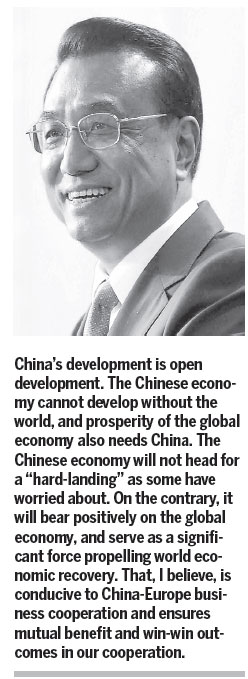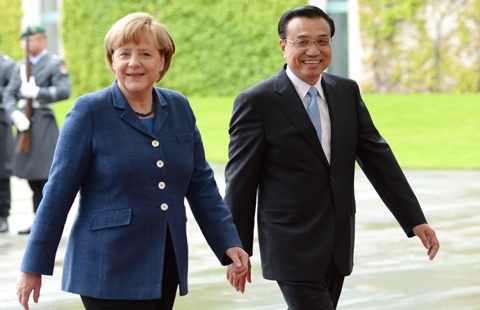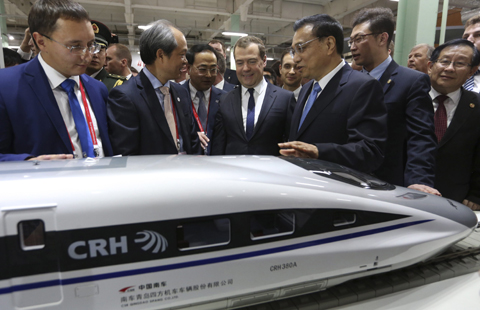
Set a new example of mutual benefit and win-win cooperation
Comments Print Mail Large Medium Small
Editor's Note: Below is the full speech by Li Keqiang, premier of the State Council of the People's Republic of China, at the Sixth "Hamburg Summit: China Meets Europe" in Hamburg on Oct 11, 2014.
Your Excellency Foreign Minister Frank-Walter Steinmeier,
Your Excellency Prime Minister Xavier Bettel,
Your Excellency President Martin Schulz,
Ladies and Gentlemen,
It is my great pleasure to attend the "Hamburg Summit: China meets Europe". Known as the "City of Bridges", Hamburg boasts a unique view with over 2,000 bridges. As I see it, Hamburg has even more intangible bridges that extend to the rest of the world. Hamburg has a time-honored tradition of free trade and had established the Hanseatic League back in the 13th century. Today, Hamburg is known to be the fastest transshipment port in Europe. In fact, one out of every three containers handled in the Port of Hamburg travels between China and Europe. This illustrates the long history and current dynamism of China-Europe exchanges.
The "Hamburg Summit: China meets Europe" 2014 has a rich program, including topics such as how China and Europe perceive each other, trade and investment order, urbanization in China, green growth, etc. I can see from the program that there is a great deal of anticipation for China-Europe cooperation. Cooperation requires more understanding of each other, so I wish to take this opportunity to brief you on the current state and future prospects of the Chinese economy.
Since the start of this year, in the face of a complex environment at home and abroad, the Chinese economy, under heavy downward pressure, has managed to maintain a stable performance on the whole. Its GDP grew by 7.4 percent in the first half of this year, a momentum that has basically continued into the third quarter. Although this figure is somewhat lower than China's high-speed growth of about 10 percent in the past, it remains a medium-to-high growth rate. Worldwide, our growth rate is still high. Given China's large economic size, the 7 percent increase in its economy today equals, if not exceeds, a 10 percent increase in its economy in the past. The increase is also equivalent to the size of a medium-sized economy.
In the beginning of this year and in recent months, there have been some small fluctuations in some of China's economic indicators, yet the economy is still running within a reasonable range. It is inevitable to have some fluctuations, which also occurred last year. And the growth of other countries is not a perfect straight line either. We maintain that the Chinese economy needs to perform within a reasonable range. The growth target for this year is set at around 7.5 percent. I would like to draw your attention to the word "around". This means that with adequate employment and relatively stable price levels, and as long as we could ensure parallel growth of household income and positive progress in protecting the environment, a growth rate slightly higher or lower than 7.5 percent would be considered acceptable. For the Chinese government, its focus is still on employment. Since the start of this year, although economic growth has somewhat slowed, employment has increased. From January to September, more than 10 million urban jobs were created, over 100,000 more than that of the same period of last year. Surveyed unemployment rate has stayed at around 5 percent in 31 big cities.
Economic growth is not a sprint but rather long-distance running that will never end. It demands certain speed. More importantly, it demands perseverance and staying power. The quality and efficiency of China's economic growth is improving, something that we hope to see. With the continued rise of the proportion of the service industry, the rapid development of emerging industries such as e-commerce, logistics and express delivery, and the growth of high-tech industries and equipment manufacturing faster than the entire secondary industry, the adjustment and improvement of industrial structure has progressed by leaps and bounds. We have also seen encouraging results in energy conservation and emissions reduction. Energy consumption per unit of GDP was down by 4.2 percent, and carbon intensity down by about 5 percent in the first half of this year, the biggest cuts in years. With growing household income, consumer demand is also rising steadily. In particular, consumption by the general public is increasing rapidly. People have enjoyed tangible benefits in the course of economic development.
The Chinese economy has made these achievements thanks mainly to reform and innovation. Despite downward pressure on the economy, we have not adopted indiscriminate strong economic stimulus; nor have we ever eased monetary policy or expanded deficit. Instead, we have vigorously promoted reform in administrative, fiscal, financial, investment and other key areas and, at the same time, reformed and innovated the approaches of macro-control by promoting structural adjustment, namely targeted macro-control on the basis of range-based macro-control. Reform is also a stimulus on the economy, as it helps to improve both the micro-foundations and the macro-environment for economic growth, and could generate huge market vitality and social creativity. We have put in place a number of reform measures to incentivize market entities, strengthen weak links and boost the real economy, with an aim to release the massive dividend of reform for development.
Since the beginning of this year, the Chinese government has continued to spearhead a "self-targeted revolution" by substantially streamlining administration and delegating powers and promoting market-based reforms so as to boost the vigor of creation and innovation for more individuals and businesses. Since the adoption of reform on the business registration system last March, we have seen an over 60 percent year-on-year growth, a massive upsurge, in other words, on the number of newly registered market entities over the past six months and more. These new businesses, mostly small and micro-enterprises or players in the service sector, have generated more than 10 million jobs, and have become a new pillar of China's economic growth thanks to their strong growth prospect. We have not only lowered the threshold of market access by offering much-needed policy support to these newly-established businesses, but also enhanced on-going and ex-post oversight, created a market environment featuring fair competition, and improved the social security network, so that those involved in entrepreneurship and innovation will have no additional worries and will grow healthily on the land we have fostered for them.
Speaking as I am, I think of a line from Goethe, which reads "If you want to love your own value, you must create value for the world." Innovation and creation is the common ideal and pursuit of mankind. We have adopted these measures of reform and innovation so that the newly-born market forces will grow steadily, and that more people will see the hope and follow suit. In this way, we will see a massive wave of entrepreneurship and innovation by the people on the Chinese land. This wave will help everyone to grasp the opportunity of realizing the dream of greater accomplishments and a colorful life. It will enable us to turn our "demographic dividend" into "talent dividend" and improve income distribution and promote social equity, so that we could achieve sustained economic growth and all-round development of the people.
To ensure stable economic performance, we will be more proactive on the basis of maintaining overall policy stability. As a next step, we will further enhance reform and innovation. In addition to removing systemic obstacles, we will also address structural problems by strengthening weak links in development and in the real economy. For example, on finance and credit, we will make good use of both existing and additional resources to support the development of agriculture, rural areas, farmers, small and micro-enterprises, emerging industries and other forms of the real economy. We will continue to advance major livelihood and development projects such as railways in Central and Western China, renovation of urban run-down areas, water conservancy and pollution prevention and treatment, and make efforts to increase the supply of public goods. With the strong driving force of reform and innovation, we have every confidence that we could achieve the main targets for this year's economic and social development.
The Chinese economy has been growing in a sustained and rapid manner for over 30 years, and it still has ample source of energy for future development. It has a bright prospect, thanks to its strong resilience of growth, as well as the huge market space and ample room for leverage. Many of you are old friends of the Chinese business community. As you may have noticed, China does have a number of advantages such as improved human resources, well-developed infrastructure, industries, capitals and technologies, and strong risk-resistance capability. Yet to know a country like China well, one also needs to see more than that, as China is a big country with over 1.3 billion people and there is uneven development between the urban and rural areas and among different regions. Much remains to be done before we could realize industrialization and urbanization. The broad space in China's rural areas and inland provinces allows the economy to grow in an incremental and gradual manner, and these are where we find still a huge potential for development. As I see it, reform and innovation is the best "excavator" to bring out the potential. The diligent and hardworking Chinese people are making innovations on the system and science and technology development through their own wisdom, thus ensuring that the Chinese economy will maintain medium to high growth rate and move to the medium-and-higher end of growth.
China's development is open development. The Chinese economy cannot develop without the world, and prosperity of the global economy also needs China. The Chinese economy will not head for a "hard-landing" as some have worried about. On the contrary, it will bear positively on the global economy, and serve as a significant force propelling world economic recovery. That, I believe, is conducive to China-Europe business cooperation and ensures mutual benefit and win-win outcomes in our cooperation.
China's development requires a peaceful international environment and a stable neighboring environment. As the global political and economic environment remains complex, China makes a major force for upholding world peace, and China is committed to upholding stability and security at the regional level. China hopes that countries may join hands, respect and live in peace with each other and seek to achieve common development.
Ladies and Gentlemen,
I have visited Europe a number of times. Europe boasts a long history and splendid cultures and is advanced in economy, science and technology. As a major pillar of the world that carries strategic significance, Europe contributes in its own way to safeguarding world peace. Europe cares about China and has an interest in China, and I believe the same is true with China about Europe. We are heartened to see the positive results in Europe's efforts to stabilize economy and regain its competitiveness. Important steps have been made towards the building of a banking union, and progress has been achieved in the structural reforms of the deeply indebted countries, with a notable drop of the treasury bond yields. We believe that Europe will emerge even stronger and more prosperous from the crisis.
Over the past four decades, the China-Europe relationship has grown from a seedling into a luxuriant tree that has borne rich fruits. Our political trust, economic cooperation and people-to-people exchanges have all scaled unprecedented heights. Since the establishment of diplomatic ties, trade between China and Europe has increased by over 230 folds. Every day, some $1.5 billion worth of trade is being conducted between the two sides, which means that during the twenty minutes of my speech today, the two sides have already concluded trade deals worth tens of millions of US dollars. The bond of common interests between us makes China-Europe relations even more appealing and expansible, which gives us every reason to be confident in the future of China and Europe.
China and Europe are two major strategic forces. We both undertake the lofty mission of promoting global economy, advancing human civilization and progress and safeguarding world peace. The two sides are expanding their converging strategic interests. During his visit to Europe last spring, President Xi Jinping called on China and Europe to work jointly to build the four bridges for peace, growth, reform and civilization between the two sides and a China-EU comprehensive strategic partnership of greater global influence, which brought our relationship to a new height. We are ready to work with the European side to keep the development of our relationship on the right track and jointly set up a new model of mutual benefit and win-win cooperation in the world. China is the largest emerging market and the EU the largest developed economy. Nothing is impossible when the two "largests" converge. And strength will be multiplied if the "emerging" meets the "developed". China-EU cooperation may serve as a fine example of that between the emerging and developed economies. China and Europe are located at the two ends of the Eurasian continent, the biggest landmass on earth and the most populous continent in the world with huge market and great development opportunities. Together China and Europe may contribute even more to promoting prosperity and development and achieving win-win and all-win development in Asia and Europe. Both sides call for greater democracy in international relations and we share common interests on many major international issues. Our relationship is acquiring more and more important global significance. The two sides may join hands in the course of promoting world peace and global governance. Both China and Europe enjoy splendid culture and the tradition of objective reasoning and speculative philosophy. While China advocates "harmony without uniformity", the EU stands for "unity in diversity". The 1.3 billion Chinese people and the 700 million European people have a common destiny and a common future. China and Europe may well take the lead in promoting mutual learning and inclusiveness between different civilizations.
Europe is committed to its integration process. No matter what may change in the international arena, China's support to the EU will remain unchanged. We support Europe in seeking greater strength through unity and a bigger role played by the EU in international affairs. We also hope the EU will continue to understand and support the development path chosen by China that suits its own national conditions and continue to respect and accommodate China's core interests.
We live in the age of new technology revolution and industrial transformation. Both China and Europe are at a critical development stage and are faced with the common task of maintaining growth, readjusting structure and creating more jobs. To deepen the results-oriented cooperation is an objective need for both sides and both face rare opportunities in doing so. There is an old saying in China which goes, "You will surely see water coming out if you really dig deep enough". We should indeed tap deeper into our cooperation potential the way we dig a well. Along that line, let me make the following proposals:
First, we should make a "grand strategy" to promote growth in trade. China and Europe together account for one third of the world economy, but our trade makes a mere 1.5 percent of global trade. Although we cannot simply draw a comparison between these two figures, this does speak to the huge potential of growth of bilateral trade. Such a potential is not just about larger scale but also about improved structure. Therefore, we need to make good planning in order to increase both the scale and quality of trade. During my current visit, our two business communities have concluded some $10 billion of agreements, which include both trade of products and technical cooperation between the two sides. We have taken note of Europe's plan to invest 50 billion euros in the building of transport, energy and digital networks. We hope that the European side will favorably consider using Chinese equipment in high-speed railway, nuclear power and other projects, as our equipment is low in cost but high in quality. We have long expressed concern over the issue of European high-tech exports to China, and we hope that the European side will give China fair treatment in effecting the upcoming reform of its export control regime. China and Europe should jointly oppose trade protectionism of all forms. We are ready to conduct consultations with the EU in search of an early consensus on the case of wireless communications equipment. The establishment of a China-EU free trade area will be a significant step for upgrading two-way trade, and the two sides may launch feasibility studies on it at an earlier date.
Second, we should take bilateral investment onto the "fast track". Investment cooperation is the manifestation of the strategic nature of China-EU relations. China and Europe should seize the favorable opportunities, build on the strong momentum of investment growth, and support their companies in expanding investment in such areas as industrial development and industrial parks. The early conclusion of a China-Europe investment agreement will provide strong guarantee for mutual investment. The two sides need to speed up the negotiation process and work for early outcomes. We hope that the European side will create a more equitable and transparent business environment for Chinese companies investing in Europe, and provide China with more facilitations on market access, entry visa, work permit and other issues. China and Europe may also work together to explore market opportunities in third countries through joint investment and other means in order to deliver benefits to all sides.
Third, we should explore the "deep ocean" of cooperation on innovation. China and Europe are both committed to conducting structural reform and upgrading economic structure. This has provided new opportunities for us to expand cooperation in new technologies, new industries and new sectors. When I visited Europe in 2012, the two sides launched the mechanism of urbanization cooperation. This is an area where a lot could be achieved through cooperation on both the "hardware" and the "software" aspects. In the area of green economy, Europe has advantages while China has the market. We believe the two sides may jointly develop a group of demonstration zones on circular economy, energy conservation and environmental protection in order to maximize the catalytic and multiplying effect of our cooperation. The two sides may also make a joint effort to advance medium-to long-term cooperation in aviation and space, and strengthen cooperation in the operation, maintenance and management of rail transport systems.
People-to-people exchanges, like a decoder, serves to dispel misgivings and forge closer bonds between people's hearts. I know that there is a food process engineer in the Rheinland-Pfalz State of Germany, who has visited China more than 250 times in the past thirty years and more. He has brought to China the technologies he knows, offered donations to areas hit by earthquakes, and provided funding support for school drop-outs. This friend of China called himself an "85 percent Chinese". His story is a perfect showcase and epitome of China-Germany and China-Europe friendship. Now, more than five million people travel between China and Europe each year, and nearly 300,000 students are studying in each other's countries. We need to further strengthen exchanges in education, science and technology, culture, sports and other fields, encourage cooperation between our cultural industries and in areas of products and services, and expand personnel exchanges, especially the interactions between our young people, so as to lay a deeper and stronger foundation for China-EU relations.
China-Germany relations have always been at the forefront of China-EU relations. On this very day 42 years ago, China established diplomatic relations with the Federal Republic of Germany. Today, this relationship has become much more mature. During my visit this time, the two sides have issued the Program of Action for China-Germany Cooperation, which includes specific plans and measures for advancing bilateral cooperation in various areas over the medium and longer terms. We are ready to continue to work with the German side to take this relationship to a new height.
The Hamburg Summit has entered its tenth year. Over the past decade, the summit has made contribution to the growth of China's relations with Germany and with Europe as a whole, and our friends present have also provided valuable insights for enhancing practical cooperation between the two sides. I wish to take this opportunity to express my thanks to you all. The summit is a place where we can gain new inspirations through the exchange of ideas. The Germans often say, "Faith can move mountains." And back in China, we have a similar story about a "foolish old man" who is determined to remove mountains that block his way. In a world of both opportunities and challenges, faith in openness and in cooperation could help us overcome the distance of mountains and oceans and embark on a journey toward mutual benefit and win-win cooperation.
To conclude, I wish the summit a full success. Thank you.

(China Daily 10/14/2014 page8)
Background






